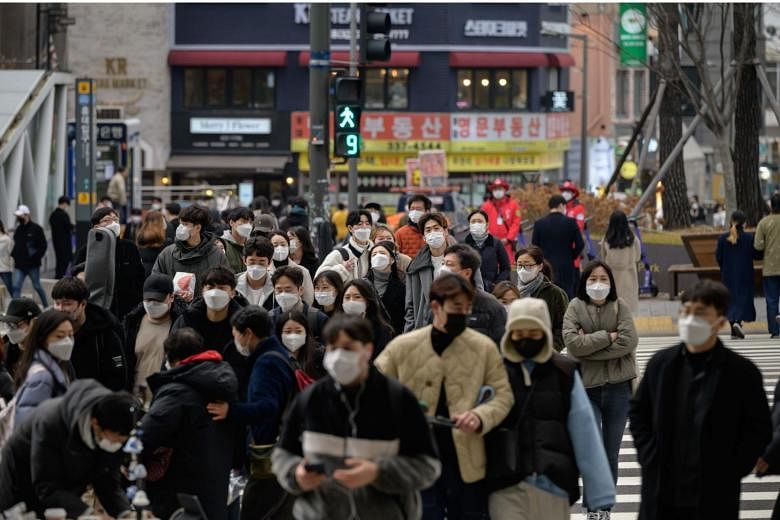SEOUL - Aiming to curb the spread of the coronavirus ahead of an all-important college entrance exam, South Korea will from Tuesday (Nov 24) tighten anti-virus measures for two weeks, such as closing clubs and bars, banning dine-in services at cafes, and imposing a 20 per cent seating cap on religious events.
This comes as the country reported 271 new cases on Monday, the first time in six days that the daily figure went below 300.
The total tally has risen to 31,004, with 509 deaths so far.
Second Health Vice-Minister Kang Do-tae warned that the third wave of the pandemic is already under way, and it is harder to contain as the virus is spreading silently in small social gatherings where people tend to take off masks, and not due to big gatherings like the two previous waves.
"Anti-virus measures and medical efforts would not be sustainable if we fail to break the chain of infections," he said during a meeting with senior health officials, noting that over 2,000 cases were registered in the past week.
Monday's tally includes the highest daily figure in the military, with 33 new cases reported, out of which 26 were traced to a cluster outbreak in an army unit in the border town of Cheorwon.
Thirty-seven of the unit's 200 members have been infected, with the rest waiting for test results.
Infections in the military have been growing since mid-November, reaching 263 to date. More than 3,500 military personnel are under quarantine.
On Sunday, the government announced it would raise the social distancing level to the third in a five-tier system in Seoul and greater Seoul (including Gyeonggi province and Incheon city) from Tuesday.
Under Level 2 social distancing, up from Monday's Level 1.5, meetings and events with more than 100 people will be prohibited.
Five major entertainment facilities including clubs and bars will have to close, while karaoke rooms and indoor sports facilities can operate until 9pm. Restaurants will have to close dine-in services at 9pm, while cafes can only run on delivery and takeout.
Kindergartens and schools can only have one-third of their student population in school, while the rest have to learn online. Only high schools are allowed to run at two-third capacity.
Religious events are permitted to fill only 20 per cent of seats, and the figure is halved for sporting events.
Seoul city has also announced its own pre-emptive measures that will remain until the end of the year, such as reducing public transportation at night and banning rallies that involve 10 or more people.
Promotions aimed at boosting the local economy, such as a dining campaign by the Ministry of Agriculture and a travel coupon scheme under the Korea Tourism Organisation, will also be suspended.
Last week's spike in cases has sparked jitters among high school seniors and their parents.
Some 490,000 students are due to sit the College Scholastic Ability Test (CSAT) on Dec 3, an exam so important that working hours are delayed, flights postponed, and police cars are dispatched to help ferry latecomers.
The exam was postponed by two weeks from last Thursday due to the pandemic.
Education Minister Yoo Eun-hae said last week that CSAT is "not an easy test to postpone again", and that they will go all out to make sure it proceeds without any hindrance.
A two-week campaign was launched last Thursday to ensure cram schools, study cafes and other facilities frequented by high schoolers will adhere to strict anti-virus measures, so as to keep exam takers safe from Covid-19.
"We can't let our guard down even the slightest bit," Ms Yoo said.












